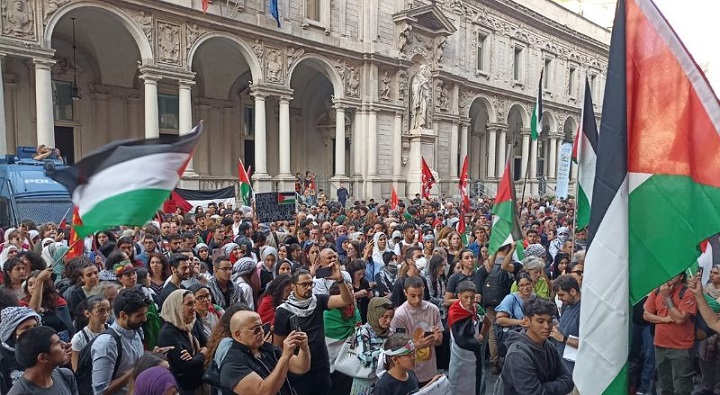
English version below
I Paesi occidentali dovrebbero smettere di concentrarsi sulla idea di porre fine delle migrazioni. Il vero problema è l’incuria all’integrazione dei migranti. È una priorità per prevenire insurrezioni come quelle di Gaza in Occidente.
Le proteste filo-palestinesi in corso nei Paesi occidentali sono un segnale importante del fatto che qualcosa è andato storto nel rapporto tra alcuni immigrati musulmani e i Paesi che li ospitano.
I governi occidentali devono essere vigili per evitare di creare nei loro Paesi una seconda situazione simile alla “striscia di Gaza” che, col tempo, potrebbe esplodere.
In Israele per molti anni il governo ha rinunciato a cercare di risolvere sistematicamente i problemi con i palestinesi a Gaza e in Cisgiordania. Ha lasciato che il problema si incancrenisse pensando che, in fondo, se era estremamente difficile da risolvere, non era un problema e bastava gestirlo come una questione di ordine pubblico.
***
In realtà, quando la situazione internazionale è cambiata, è cambiata anche la questione palestinese e ha portato all’attacco terroristico razzista del 7 ottobre. Ora ci sono segnali di un profondo ripensamento in Israele. Il problema palestinese deve avere una soluzione più rotonda.
Secondo Yair Golan, ex generale delle Forze di Difesa israeliane fino al 2017, “prima di tutto dobbiamo ridurre gli attriti civili [con i palestinesi]. Ciò significa che dobbiamo modellare i nostri futuri confini come abbiamo iniziato a fare durante l’attuazione del piano di disimpegno da Gaza nel 2005. È stato un bene per Israele, diminuire l’attrito civile. Così facendo si offrono sempre meno opportunità ai terroristi”.
Un’analoga riflessione profonda è necessaria anche nei Paesi occidentali sugli immigrati dai Paesi musulmani che sono scesi in piazza a sostegno della causa palestinese, spesso ignari del massacro razzista di Hamas.
In effetti, in Europa o in America, gli immigrati musulmani non sono isolati in ghetti murati, non ci sono antiche lamentele sul possesso della terra ancestrale, come per i palestinesi e gli israeliani, ma c’è un crescente problema di integrazione.
Ci sono evidentemente immigrati musulmani che, in apparenza, esprimono odio e ripugnanza nei confronti di Israele. Tuttavia, “Israele” è uno specchio che riflette le loro lagnanze e insoddisfazioni verso le nazioni occidentali dove vivono.
Nei loro nuovi Paesi di residenza si sentono apparentemente cittadini di seconda classe, emarginati, rifiutati e non graditi, anche se lavorano e contribuiscono alla società. È in gioco una questione sociale, politica e culturale.
***
La situazione dimostra che molti occidentali guardano al problema dell’immigrazione dalla parte sbagliata della lente.
In effetti, l’immigrazione deve essere controllata e incanalata perché le società occidentali non possono sopportare l’assalto di frontiere libere e incontrollate.
Tuttavia, solide forze economiche da tutte le parti, dai Paesi in via di sviluppo e da quelli sviluppati, spingono per un flusso di manodopera dal Sud globale al Nord globale. Il Nord ha bisogno di una forza lavoro che la sua demografia in declino e il mercato in rapida evoluzione non possono fornire. Questi lavoratori possono venire dal Sud, dove migliori condizioni di vita consentono ad alcune persone più avventurose e intraprendenti, con legami familiari o fondi da investire, di avventurarsi nel viaggio di migrazione.
È impossibile fermare il flusso, che provocherebbe un doppio collasso sociale ed economico sia al Sud che al Nord. I posti di lavoro occupati da questi migranti sono fondamentali per il normale funzionamento del Nord; la speranza di migrare e le rimesse contribuiscono a far funzionare il Sud. C’è quindi un legame molto stretto. Deve essere gestito, ma è impensabile romperlo.
Tuttavia, è stato trascurato un problema più grande, su cui l’Occidente è stato frivolo o superficialmente liberale: quello dell’integrazione culturale.
Le massicce proteste a favore di Hamas sono organizzate da persone che si trovano già nei Paesi occidentali, ma che apparentemente non si sentono culturalmente a loro agio o vogliono trasformare i Paesi occidentali in Paesi islamici. Ci sono elementi di protesta sociale.
Persone che 40 anni fa si dichiaravano socialiste o comuniste ora incanalano le loro rimostranze tra le braccia dei raduni pro-Hamas. Ma non è solo questo. C’è una nuova difficoltà nel modificare il vecchio melting pot culturale occidentale per l’integrazione degli immigrati musulmani.
***
Il cambiamento della natura del melting pot è un vecchio problema in America, dove ogni ondata di nuovi immigrati ha trovato l’ostilità dei vecchi residenti. Ma è un problema nuovo in Europa. Qui, alcuni partiti confondono l’ordine dell’equazione. La vera questione è l’integrazione delle persone residenti e cittadini in Europa, non il blocco ai nuovi arrivati.
Gli immigrati che arrivano nei Paesi ospitanti devono rispettare le leggi e i costumi locali. Si tratta di leggi e costumi liberali, basati su un patrimonio culturale e una tradizione specifici.
I Paesi ospitanti, grazie alla loro tradizione liberale, possono permettere la coesistenza di religioni diverse, ma lo stesso non può accadere con i costumi e le leggi. Gli immigrati, qualunque sia il loro background, devono attenersi al sistema di valori liberale tradizionale che caratterizza il mondo occidentale in cui si sono trasferiti.
Il mancato rispetto di queste leggi da parte di alcuni immigrati deve essere affrontato con fermezza. Si tratta indubbiamente di un problema di ordine pubblico, ma non solo. Si tratta di una profonda questione culturale e sociale. Gli immigrati, cioè, devono essere integrati culturalmente nell’Occidente.
Il problema è stato ignorato per anni, ma il recente attacco terroristico del 7 ottobre è un monito per i Paesi occidentali. L’integrazione, secondo i tradizionali costumi occidentali, deve diventare una priorità. Devono far parte del Paese che li ospita, condividendone i valori liberali. Devono diventare un ponte verso il loro Paese d’origine e non la quinta colonna di una ribellione.
Anche in questo caso, l’esperienza di Israele è fondamentale. Alcuni sostenevano che il problema di Gaza fosse troppo complicato da risolvere e che quindi non fosse più un problema finché fosse stato contenuto. Si sbagliavano. Allo stesso modo, chi in Europa sventola la bandiera dell’anti-immigrazione ma dimentica l’integrazione, getta i semi di future rivolte esplosive.
La Chiesa e l’insegnamento del Papa, che da anni si rivolge al mondo musulmano, sono di fondamentale importanza per colmare il divario di comprensione tra l’Islam radicale e il mondo occidentale. Qui si può fare molto di più. Ma, cosa forse ancora più importante, gli Stati e i governi occidentali dovrebbero imparare ad avere le giuste priorità.
When Gaza-like protests come to the West
Western countries should stop focusing on ending migration. The real problem is being careless about migrants’ integration. It is a priority to prevent Gaza-like insurrections in the West.
The ongoing pro-Palestinian protests in Western countries are an important signal that something went very wrong with the relationship between some Muslim immigrants and their host countries.
Western governments need to be vigilant to avoid breeding a second “Gaza strip”-like situation in their own countries that, in time, could blow up in their faces.
In Israel, for many years, the government gave up on trying to solve systematically the problems with the Palestinians in Gaza and the West Bank. It let it fester, thinking that if it was tough to solve, it was not a problem after all, and it was enough to manage it as a law-and-order issue. When the international situation changed, so did the Palestinian issue, and it led to the October 7 racist terrorist attack.[1] Now, there are signs of a deep rethinking in Israel. The Palestinian problem needs a better solution.
According to Yair Golan, a former general in the Israeli Defense Forces until 2017, “First and foremost, we need to lessen civilian friction [with Palestinians]. The meaning of that is that we need to shape our future borders like we started to do during the implementation of the Gaza Disengagement Plan in 2005. It was good for Israel, lessening the civilian friction. By doing that, you provide less and less opportunities for terrorists.”[2]
Similar deep thinking is also necessary in Western countries about immigrants from Muslim countries who took to the streets in support of the Palestinian cause and are often oblivious of the Hamas racist slaughter.
Indeed, in Europe or America, Muslim immigrants are not secluded in walled ghettos; there is no old grievance about ownership of the ancestral land, like with Palestinians and Israelis, but there is a growing problem of integration.
There are evidently Muslim immigrants who, on the surface, show hatred and loathing against Israel. However, “Israel” is a mirror to reflect their gripes and dissatisfaction with the Western nations where they live after leaving their ancestral homes.
In their new home countries, they apparently feel like second-class citizens, marginalized, rejected, and unwelcome, although they work and contribute to society. There is a social, political, and cultural issue at stake here.
A wrong angle
The situation proves that many Westerners look at the immigration problem from the wrong end of the glass.
Indeed, immigration has to be controlled and channeled because Western societies can’t withstand the onslaught of unchecked and free borders.
Still, solid economic forces on all sides, from developing and developed countries, push for a flow of labor from the global South to the global North. The North needs a workforce that its declining demography and the fast-paced market cannot supply domestically. These workers can come from the South, where improving living conditions enable a few more adventurous, entrepreneurial people with family connections or funds to invest to take the leap of a migration voyage.
It is impossible to stop the flow, and it would cause a double social and economic collapse both in the South and the North. The jobs filled by these migrants are crucial for the normal functioning of the North; the hope of migration and the remittances help keep the South humming and running. So, there is a very tight bond there. It has to be managed, but it’s unthinkable to break it.
However, a bigger problem has been neglected, and it is one the West has been cavalier, or superficially liberal, about – that of cultural integration.
The massive pro-Hamas protests are organized by people who are already in Western countries but seemingly feel they are not culturally there or want to turn Western countries to Islamic rule. There are elements of social protest.
People who, 40 years ago, claimed to be socialists or communists now channel their remonstrations into the arms of pro-Hamas rallies. But it is not only that. There is a new difficulty in altering the old Western cultural melting pot for the integration of Muslim immigrants.
The changing nature of the melting pot is an old problem in America, where each wave of new migrants found the hostility of the old settlers. But it is a new issue in Europe. Here, some parties confuse the order of the equation. The real problem is the integration of the people who are residents and citizens of Europe, not stopping the newcomers.
Immigrants who come to their host countries must abide by the local laws and customs. These laws and customs are liberal, based on a specific cultural heritage and tradition.
Host countries, because of their liberal tradition, can allow different religions to coexist, but the same can’t happen with customs and laws. The immigrants, whatever their background, must abide by the traditional liberal value system that shapes the Western world where they moved.
The failure of some immigrants to abide by these laws should be firmly addressed. It is undoubtedly a law-and-order issue, but not only that. It is a profound cultural and social issue. That is, immigrants have to be culturally integrated into the West.
The problem has been ignored for years, but the recent October 7 terrorist attack is a warning to Western countries. Integration, according to traditional Western customs, must become a priority. They must be part of their host country, sharing their liberal values. They have to become a bridge to their country of origin and not the fifth column of an insurrection.
Again, the experience of Israel is essential. Some people claimed that the problems of Gaza were too tricky to solve, and thus, it was no longer a problem as long as it was contained. They were wrong. Similarly, people in Europe waving the anti-immigration flag but forgetting about the crucial integration sow the seeds of future explosive uprisings.
The Church and the teaching of the Pope, who has been reaching out to the Muslim world for many years now, is of essential importance to bridge a gap of understanding between radical Islam and the Western world. Much more can be done here. But, perhaps even more importantly, Western states and governments should learn to get their priorities right.
[1] See http://www.settimananews.it/informazione-internazionale/intelligence-and-culture-missing-for-china/ and http://www.settimananews.it/politica/netanyahu-fallen-paradigm/
[2] https://jstribune.com/the-jerusalem-strategic-tribune-talks-yair-golan/






Sacrosante priorità! Purtroppo, soprattutto in alcuni paesi (v. Francia), si è in forte ritardo. L’integrazione, particolarmente quella culturale, è fondamentale per ridurre possibili elementi di scontro tra civiltà diverse e non può più essere rimandata pena un pericoloso confronto tra occidente ed Islam.